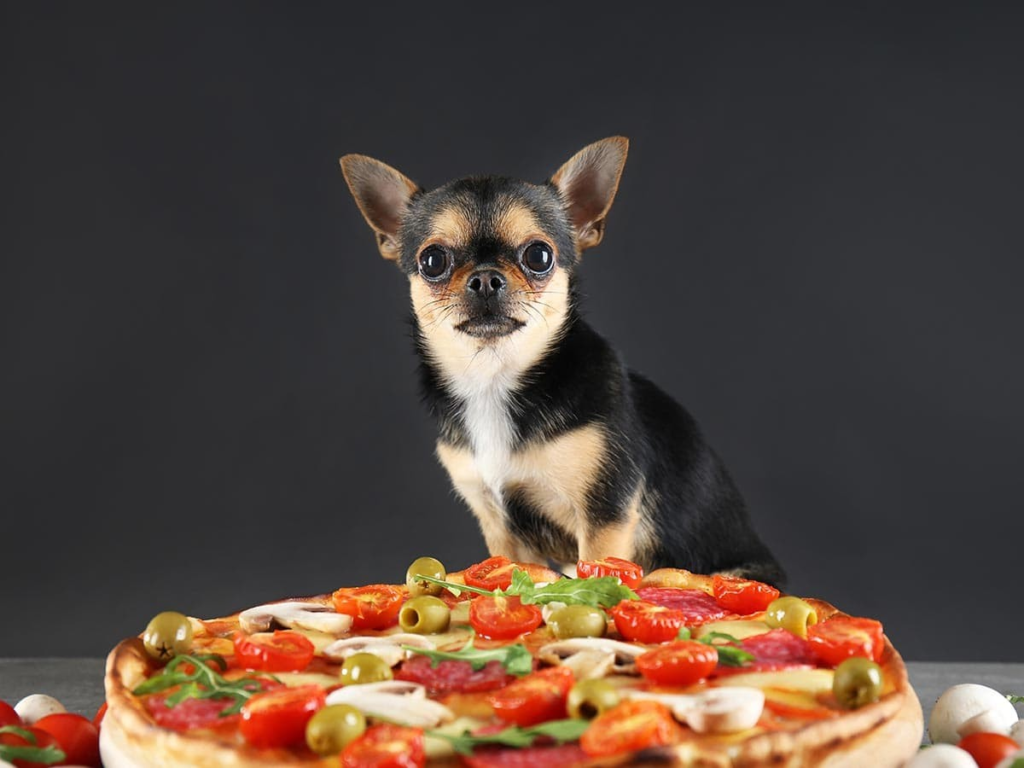
Pepperoni is a popular cured meat often enjoyed on pizzas, sandwiches, and as a snack. As dog owners, it’s essential to be mindful of what foods we share with our furry friends. In this article, we will explore whether dogs can safely eat pepperoni, the potential risks associated with it, and the considerations to keep in mind when it comes to your dog’s diet.
- Potential Risks of Pepperoni for Dogs: While pepperoni may be tempting to share with your dog, there are several reasons why it’s best to avoid feeding it to them:
- High Fat Content: Pepperoni is high in fat, which can be problematic for dogs. Excessive fat intake can lead to pancreatitis, a condition characterized by inflammation of the pancreas.
- Salt and Sodium Content: Pepperoni is often heavily seasoned and contains high levels of salt and sodium. Excessive salt intake can be harmful to dogs and may lead to dehydration or sodium ion poisoning.
- Spices and Seasonings: Pepperoni typically contains various spices, such as garlic and onion powder, which can be toxic to dogs in large amounts.
- Processed Meats: Processed meats like pepperoni often contain additives, preservatives, and other ingredients that may not be suitable for dogs and can potentially cause digestive upset or allergic reactions.
- Potential Health Effects: Feeding pepperoni to dogs can have various negative health effects, including:
- Digestive Issues: The high fat and salt content in pepperoni can cause gastrointestinal distress, including diarrhea, vomiting, or even more severe conditions like pancreatitis.
- Increased Risk of Obesity: The high-calorie content of pepperoni can contribute to weight gain and obesity in dogs, which can lead to other health problems such as joint issues, heart disease, and diabetes.
- Safer Alternatives for Treating Dogs: While pepperoni is not recommended for dogs, there are many safer and healthier alternatives you can use to treat your furry friend:
- Dog-Safe Treats: Opt for commercially available dog treats that are specifically formulated for dogs and made with high-quality ingredients. Look for treats that are low in fat, salt, and added spices.
- Natural Food Treats: Consider using small pieces of cooked, unseasoned lean meats such as chicken or turkey as occasional treats. Make sure to remove any bones and skin before offering them to your dog.
- Fresh Fruits and Vegetables: Some fruits and vegetables, like sliced apples or baby carrots, can make safe and healthy treats for dogs. However, always check that the fruits or vegetables you offer are safe for canine consumption.
- Consulting with Your Veterinarian: If you have any specific questions or concerns about your dog’s diet or certain food items, it’s best to consult with your veterinarian. They can provide personalized advice based on your dog’s breed, age, health condition, and dietary needs.
While pepperoni may be delicious for us, it’s not a safe or recommended food for dogs. The high fat, salt, and seasoning content, as well as the potential for additives and preservatives, make it a risky choice. It’s essential to prioritize your dog’s health and well-being by offering them a balanced and appropriate diet. Stick to dog-friendly treats and consult your veterinarian for guidance on suitable treats and foods that will keep your dog happy and healthy. Remember, keeping your dog safe and nourished is key to their overall well-being.